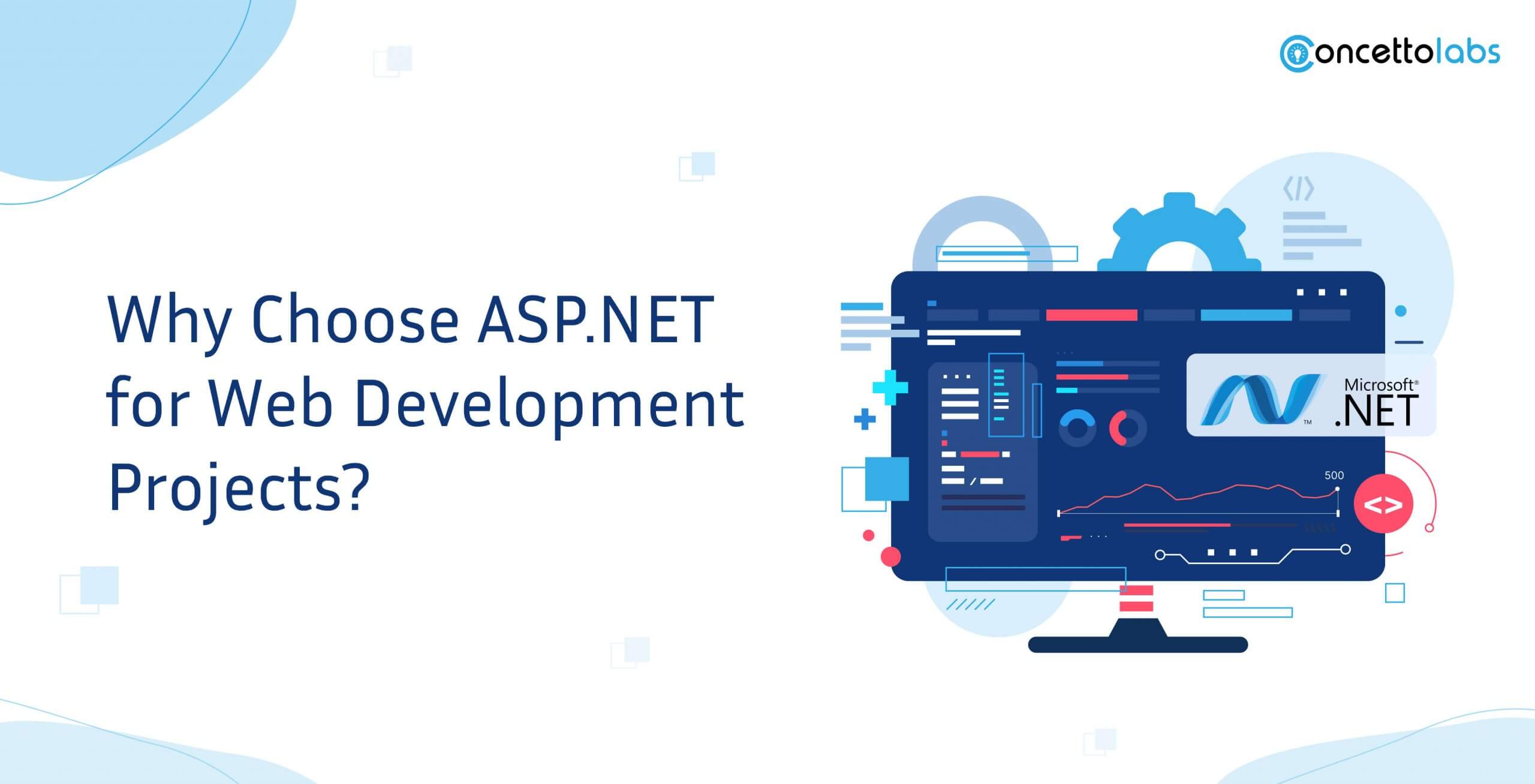
Table of Contents
Quick Summary: Readout this blog before choosing ASP.NET for your next web development project. ASP.NET offers benefits like robust performance, scalability, security and extensive support. This blog summarizes the features, benefits and reasons to choose ASP.NET language for any web development project.
ASP.NET for web development has become a highly recognized platform among organizations in recent years because of its robust development architecture. Python, Ruby on Rails, Java, and other programming languages have offered ASP.net severe competition, but the latter has consistently shown its worth by producing reliable and scalable IT solutions.
Microsoft developed and published ASP.net in 2002; it helps businesses improve the speed and load-bearing capacity of their websites. Professional web developers all over the world have therefore highly adapted.Net, whether they work for small start-ups or major corporations. .NET is a fairly apparent choice for creating a robust web or desktop solution because of its cross-platform friendliness and ease of use in creating APIs.
Additionally, ASP.net is a very safe and secure open-source development platform. Programmers can develop any kind of desktop software, online application, and more by using many languages and frameworks.
Your new web development project would benefit greatly from using.Net since it allows you to work with C#, JavaScript, F#, Visual Basic, and more, making it easier for developers to interact with the process.
For their next project, developers should consider using ASP.NET development for a number of reasons. In this piece, we examine these factors and discover just what makes ASP.NET unique in the industry and contributes to its high user rating.
What are the Key Benefits of Using ASP.NET Technologies?
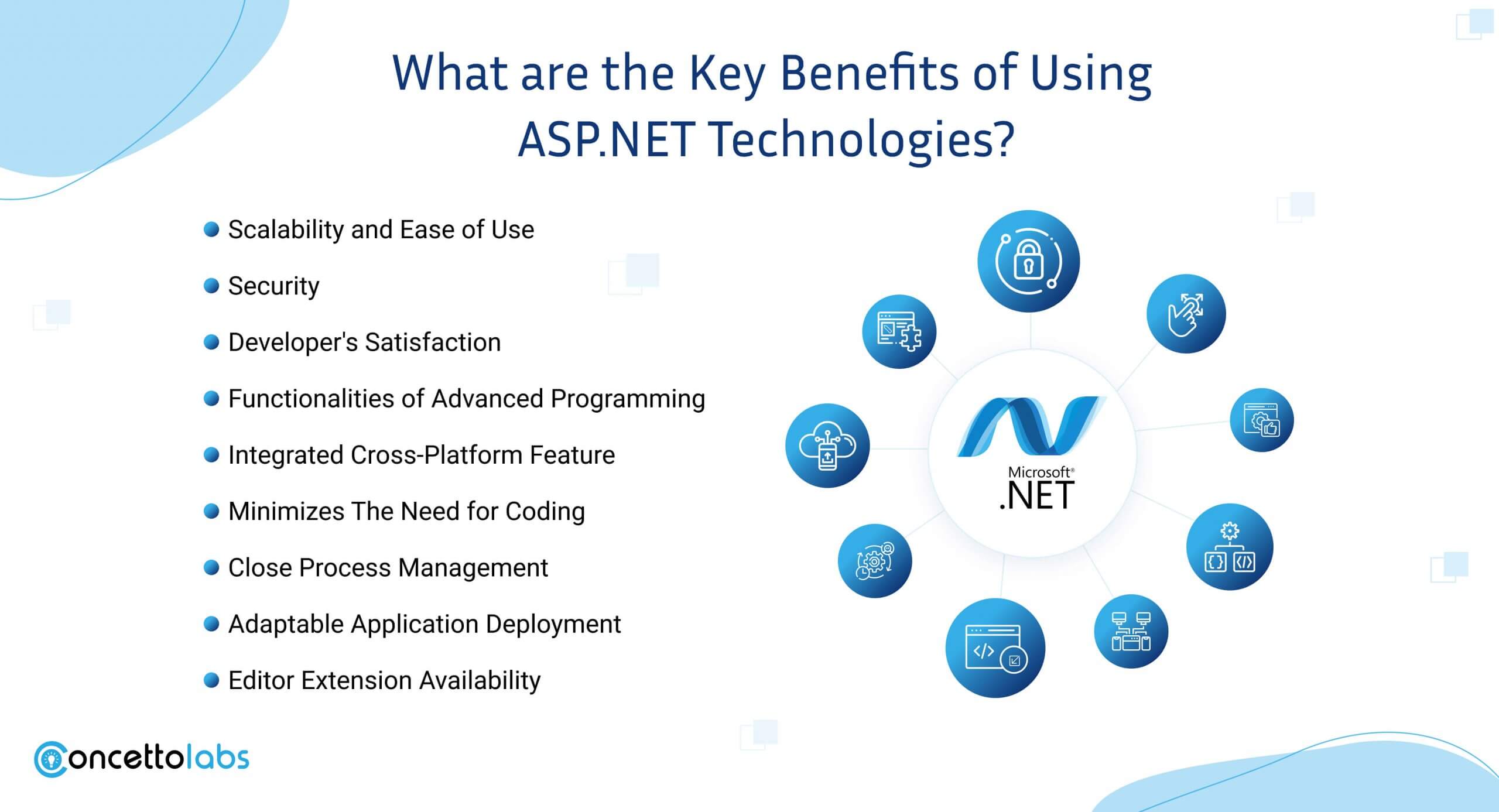
There are many advantages of ASP.NET server-side, open-source web application framework, check out more here:
1. Scalability and Ease of Use
Developing dynamic, reliable, and scalable web applications is a good usage for ASP.NET. Every ASP.NET application manages processes to replace inactive ones with active ones to process requests during runtime. Simple form submission, client authentication, site configuration, and deployment are just a few of the common activities made possible with ASP.NET.
2. Security
Because of its per-application setup and built-in Windows authentication, ASP.NET is the greatest option for developing entirely secure apps.
3. Developer’s Satisfaction
ASP.NET allows for the development of huge apps with minimal coding. The Visual Studio integrated development environment includes a toolbox and designer along with this Microsoft framework. ASP.NET has developer-friendly capabilities, including drag-and-drop server controls, WYSIWYG editing, and automatic deployment.
Developers Favor Asp.Net technologies because they are simple to construct and maintain due to HTML and source code availability.
4. Functionalities of Advanced Programming
ASP.Net for web Development has improved throughout time with a few user-friendly features. .NET developers’ web development experience and business owners’ product outcomes have both improved thanks to these extensive features.
Package management, multi-language support, RESTful API connection, development of MVC web applications, automatic memory management, and asynchronous programming are some of the advanced programming functionalities or features of ASP.Net core.
5. Integrated Cross-Platform Feature
Cross-platform integration is one of the .NET’s greatest benefits, it enables programmers to construct online and mobile applications that function across a variety of operating systems, including Microsoft Windows and Apple’s macOS.
The features don’t end here; developers can design excellent IT solutions that function on a variety of OS platforms by independently packaging and installing .NET solutions.
Thus, one of the greatest benefits of using the platform for your upcoming web development project is this.
6. Minimizes The Need for Coding
The web development project now requires less code due to the.Net framework’s modification. Using the ASP.Net programming language, it enables web developers to create larger web applications with less work.
7. Close Process Management
The Asp.net runtime aids in the management of all active processes. This is advantageous because it ensures that the application is always ready to handle requests by promptly creating a new process whenever one of the existing ones stops functioning or dies.
Asp.net makes a lot of things easier to do, like deploy, configure, and submit forms, as well as client authentication.
8. Adaptable Application Deployment
Using the.Net framework to deploy web applications offers a high degree of freedom. Framework-dependent and self-contained web application deployment are the two methods that ASP.Net supports. A software programmer can easily launch the software, app, or web solution thanks to the deployment system’s great degree of flexibility.
9. Editor Extension Availability
Editor plugins for ASP.Net help developers with code completion and syntax highlighting. These elements are essential to guaranteeing a seamless and user-friendly software, web page, and application development process.
Which Types of ASP.NET Technology Development?
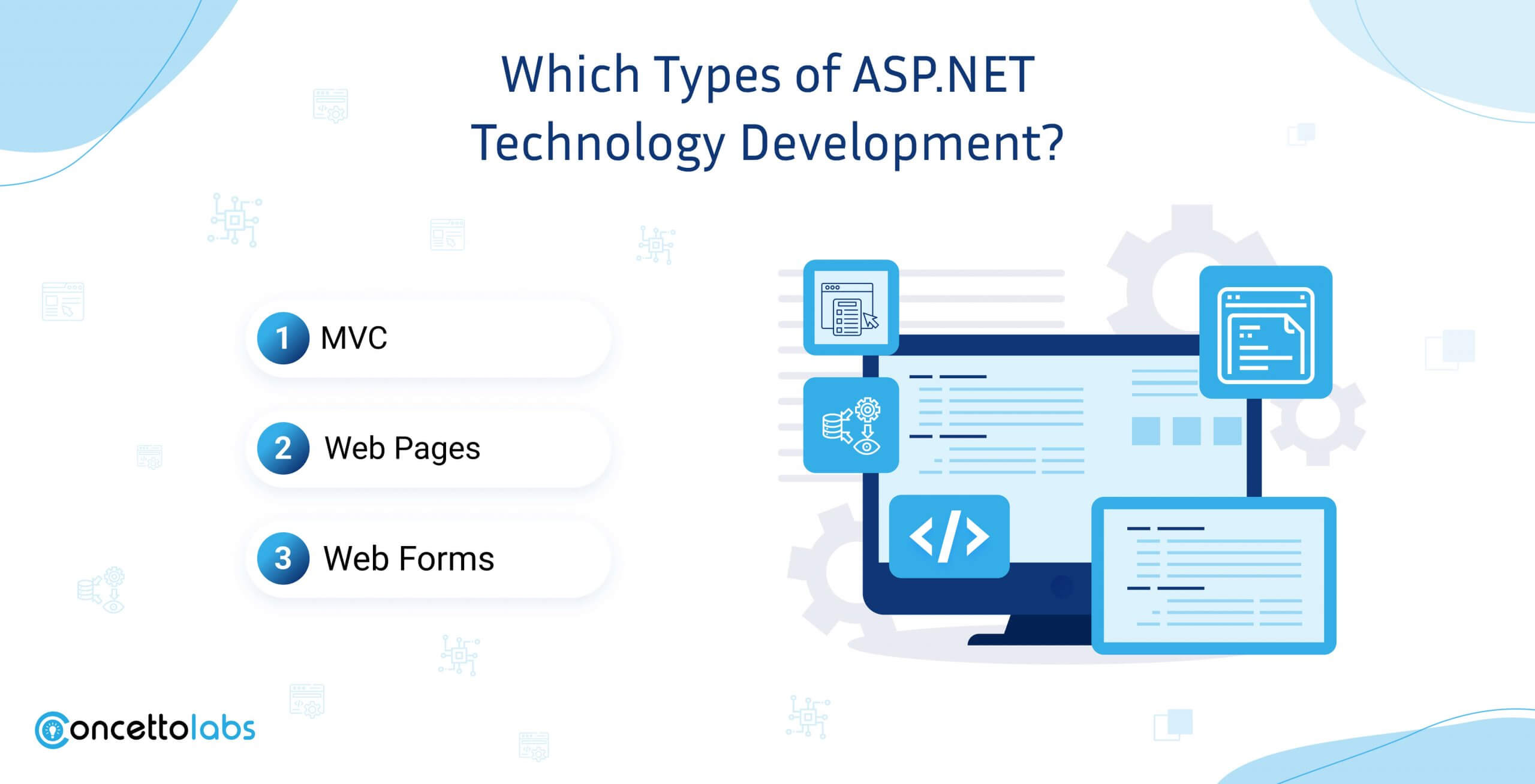
The following section will address the three different approaches to developing ASP.NET applications:
1. MVC
One benefit of this Microsoft technology is that MVC ASP.NET technology is built on MVC architecture. The development of ASP.NET-based applications is simpler for developers. It is easier to create sophisticated apps faster using this MVC design. Developers are able to alter MVC patterns and behaviour to suit the needs of the business application.
2. Web Pages
This kind of ASP.NET programming enables programmers to work with PHP and HTML. Rapid Application Development allows for the creation of web pages with ASP.NET with little to no code.
3. Web Forms
ASP.NET programming of this kind is helpful for creating dynamic, compact, and quick-to-launch apps. Programmers have more control over this kind of development as compared to the MVC style and require less coding.
As a Microsoft Certified Partner, we have extensive knowledge of the newest asp.net, UI, and methodology in addition to a track record of successfully managing challenging.NET programming projects. Our development process is agile, and we use this to provide highly scalable and effective solutions.
Which are the Components in ASP.NET?
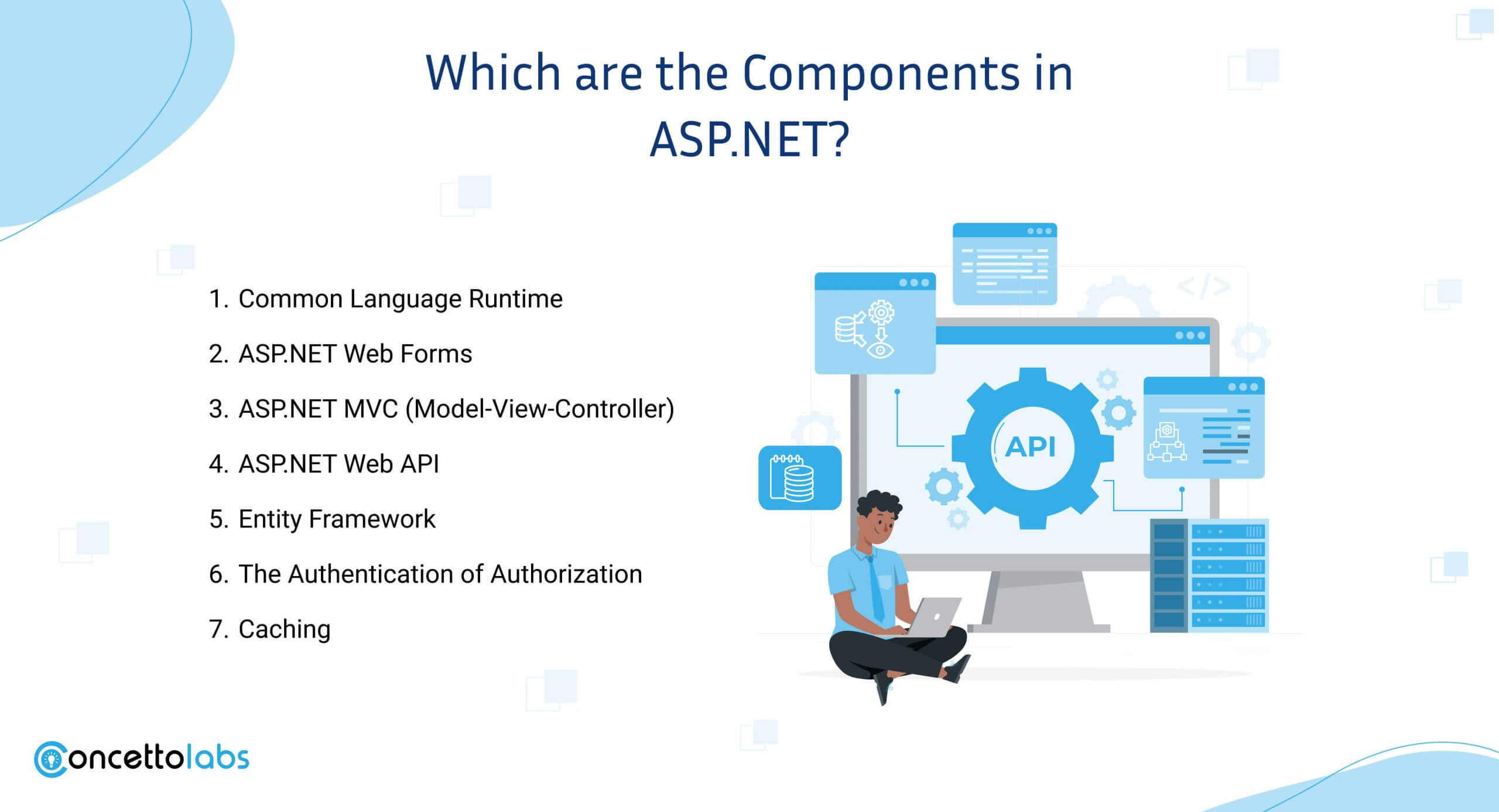
A comprehensive collection of frameworks and tools for creating dependable, scalable online applications are available to developers using ASP.NET.
Its fundamental elements are essential building blocks for developing dynamic, interactive websites; learn more about these elements.
1. Common Language Runtime
The foundation of ASP.NET is the Compiler Language Runtime, or CLR for short. It can execute C#, Visual Basic, or F# code.
In addition, CLR provides security management, memory management, type safety, exception handling, and Just-In-Time compilation (JIT), which translates intermediate language code (ILC) into machine code in real-time for effective program execution.
2. ASP.NET Web Forms
The ASP.NET Framework’s ASP.NET Web Forms provide web application developers with an easy-to-use visual drag-and-drop designer for creating user interfaces for web applications that incorporate server-side controls and event-driven models.
Its stateful programming paradigm also makes application development easier because it maintains the control state throughout post backs.
3. ASP.NET MVC (Model-View-Controller)
The Model represents data/logic for the program. ASP.NET MVC is a web application framework that adheres to the Model-View-Controller architectural pattern. This allows for a clear separation of concerns for managing an application’s data, logic, and presentation.
On the other hand, the Controller coordinates changes to data flow, structure, presentation, etc., while the View depicts user interaction.
4. ASP.NET Web API
With the help of the sophisticated framework ASP.NET Web API, programmers may create HTTP services that are instantly usable by both desktop and mobile applications.
This is crucial for creating cutting-edge, scalable websites that leverage Web APIs since it supports RESTful APIs like GET, POST, and PUT as well as content negotiation strategies.
The most recent version of ASP.NET is ASP.NET Core. It is a free cross-platform framework that enables the building of web applications for contemporary operating systems including Windows and macOS.
ASP.NET Core makes it possible to construct modern web apps for free across platforms, with features like dependency injection and middleware pipeline support, as well as support for cutting-edge web technologies like Blazor or Razor Pages for simple web app creation with few code modifications required.
5. Entity Framework
An object-relational mapper is Microsoft Entity Framework (ORM). By providing an abstraction layer, EF streamlines database access. Database developers can leverage object-oriented concepts to simplify data reading, writing, updating, and deleting, including support for SQL Server and MySQL databases.
6. The Authentication of Authorization
ASP.NET comes with integrated mechanisms for authorization and authentication that contribute to the security of web applications. For the purpose of establishing finely-grained user access control rules to limit their web apps, the framework enables role-based or claims-based authorization in addition to Windows Authentication and OAuth.
7. Caching
By swiftly fetching and re-accessing frequently used data from memory, ASP.NET’s robust caching features can improve the efficiency of any web application.
Developers should choose a caching strategy based on the specific requirements of their application to achieve the best possible application performance. Various caching strategies, such as data or output caching, are available.
Want to Know More About ASP.NET Services and Features?
What are the Uses of ASP.NET?
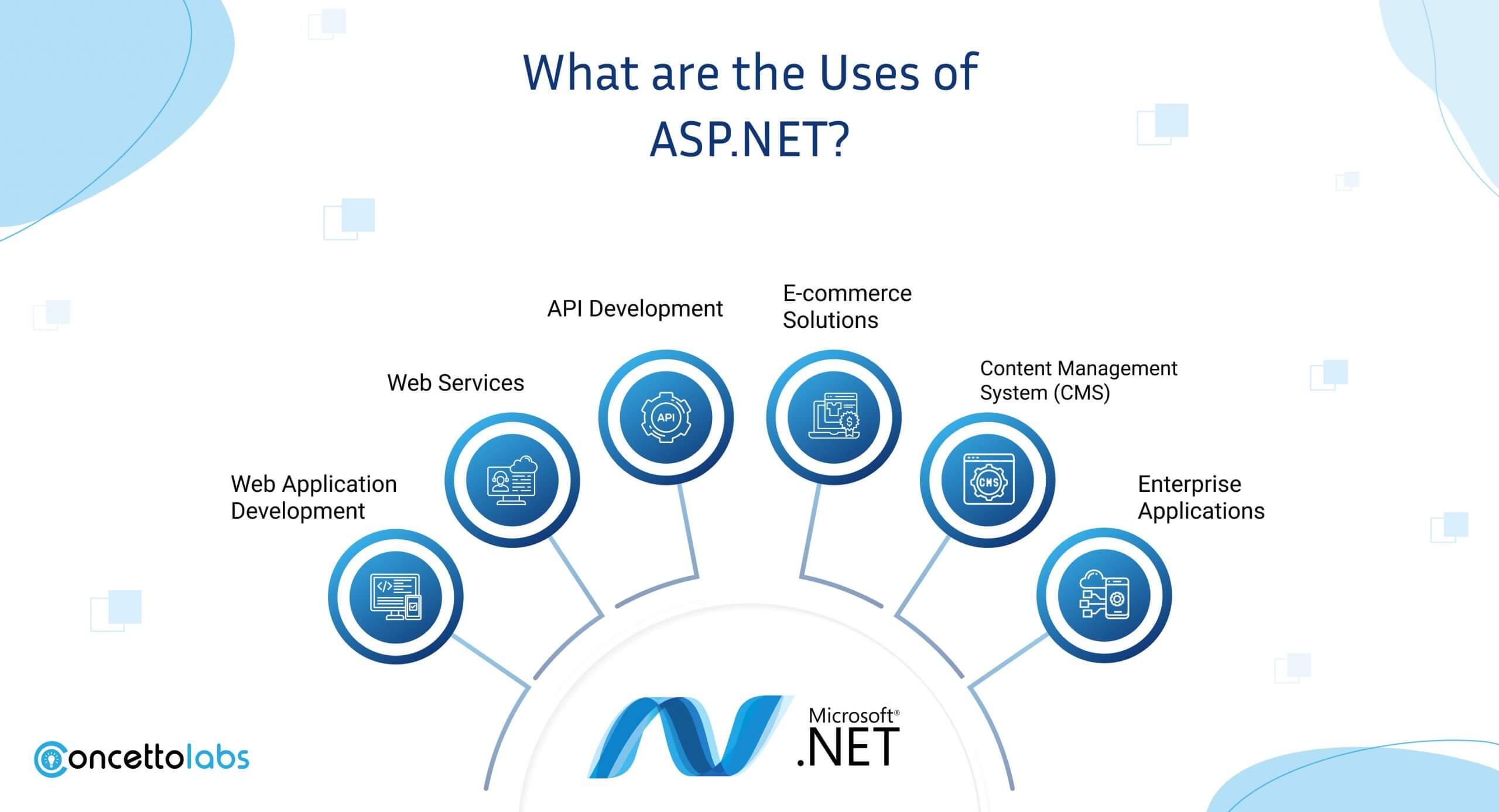
By providing a variety of tools, frameworks, and components for online application construction, ASP.NET enables developers to create dependable and scalable web applications.
This framework allows programmers to create scalable, reliable applications by utilizing ASP.NET frameworks and components.
1. Web Application Development
The development of web applications was the primary purpose behind the creation of ASP.NET. Using C# or Visual Basic.NET as programming languages, it provides an MVC architecture and libraries to streamline the development process and produce reliable web applications.
2. Web Services
With the help of ASP.NET, programmers can create web services that facilitate data integration and exchange by utilizing protocols like SOAP and REST for software application communication over the Internet.
3. API Development
Since APIs are becoming more and more common, ASP.NET now supports them as more developers use them. APIs are tools that developers can use to provide functionality and data between applications, simplifying the process of integration and interoperability.
4. E-commerce Solutions
Because ASP.NET can handle secure transactions, user authentication/authorization management, and payment gateway connection, it has become a popular choice when developing online shops and e-commerce sites.
Because of these features, ASP.NET is a desirable option for developing online commerce platforms.
5. Content Management System (CMS)
The foundation of many content management systems (CMSs) is ASP.NET. Built with this programming language, Umbraco or Sitecore CMS platforms provide strong platforms for managing administrative operations, user authentication, and website content.
6. Enterprise Applications
ASP.NET is a useful tool for creating enterprise applications with increased scalability, security, and performance.
Because ASP.NET is compatible with Microsoft technologies like SQL Server, Azure, and Active Directory, it is a desirable choice for large-scale applications.
Thinking to Develop Something Unique and Innovative to Enhance Customer Satisfaction
Why Choose ASP.NET For Your Next Web Development Project?
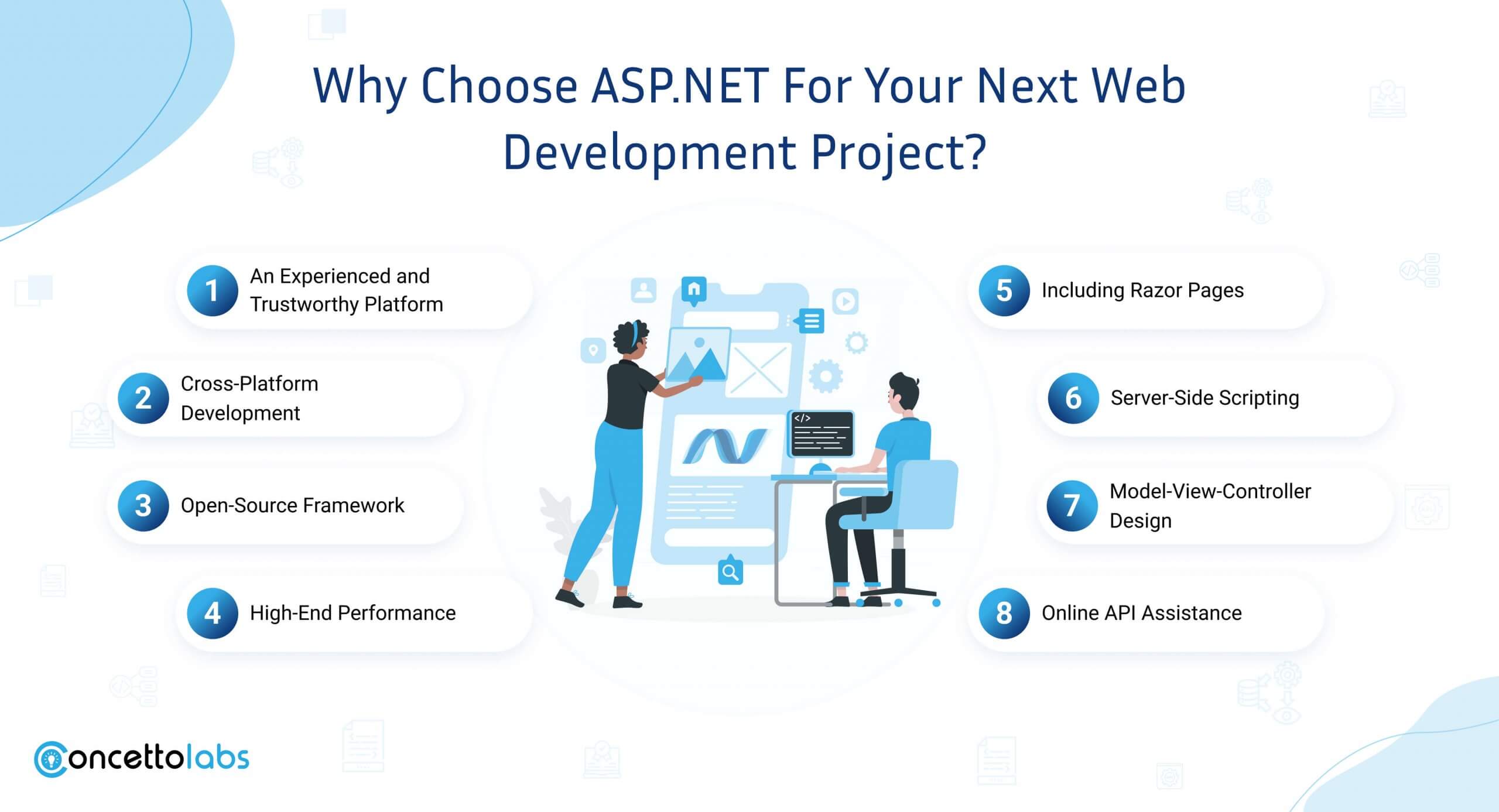
Since its inception, ASP.net has demonstrated its value by providing safe corporate web development solutions. For several subtle reasons, millions of developers prefer the ASP.NET framework over others.
The aforementioned advantages represent but a small portion of the potential benefits. Web developers should employ this framework in their web application development projects because of its many user-friendly features and strong benefits.
Here are some further arguments that will persuade you of Microsoft’s ASP.Net platform’s actual practical efficiency:
1. An Experienced and Trustworthy Platform
Having been in use for more than 20 years, ASP.NET is a dependable and mature framework. Developers can be confident in its dependability as Microsoft continues to maintain and enhance it, despite its evolution over time.
2. Cross-Platform Development
With the release of .NET Core, ASP .NET is now a cross-platform framework. The ability to create and run ASP .NET apps on Windows, macOS, and Linux gives developers flexibility and enables the deployment of applications on a range of hosting settings.
3. Open-Source Framework
The open-source framework’s utility has increased beyond measure. It is perfect for developers to evaluate, edit, and modify codes because they are available as open-source.
The ASP dot net development platform also gets bug fixes, version updates, and new function add-ons on a regular basis. That means you won’t have to wait a long time for your upgrades to be finished.
Updating framework components in accordance with project requirements is another advantage of this software platform; that is, it enables you to install and update the latest version of a particular package without upgrading the framework as a whole. As a result, you work on your project and save a ton of time.
4. High-End Performance
Because of its guaranteed high-end performance, ASP.Net has drawn millions of developers and business owners to use this free and cross-platform programming platform.
You may benefit from programming languages like C#, F#, and Visual Basic using the.NET platform. This platform optimizes the performance of your web application even in the face of high traffic because to its exceptional flexibility, scalability, and high-quality components.
Object-oriented .NET language can develop more effective and reusable code with fewer lines of code due to net languages. These codes are very simple to maintain in addition to that. Dot Net is another addition to Microsoft’s platform that allows for tool optimization and improved performance.
To improve the quality of the web application’s code, the development framework smoothly integrates automatic code optimization techniques during code compilation. This framework also includes fresh ideas, the most recent updates, faster release cycles, and much more.
5. Including Razor Pages
The ASP.Net Core framework now includes Razor Pages as a new feature. This kind of web page design chooses a file-based routing method, which removes most of the ASP.NET MVC dependence. It aids in improving the programming efficiency necessary for the creation of the web application.
Businesses can increase productivity by enhancing the user interface with ASP.Net and Razor pages.
Razor pages make using the ASP.Net framework for online application development simple and rewarding. Furthermore, the top ASP.Net development business typically uses Razor pages to create scalable, reliable, and high-performing apps.
6. Server-Side Scripting
With the aid of server-side scripting and Aasp .Net Developers can construct dynamic, feature-rich web pages that enhance the interactivity and feature-richness of web applications. Reducing client-side demand using server-side scripting can improve performance.
1. Model-View-Controller Design
ASP.NET uses the MVC design, which promotes a distinct separation of duties. This architectural pattern promotes development team collaboration by improving the application’s structure, testability, and code maintainability.
2. Online API Assistance
Because it makes RESTful Web API development easier, ASP.NET is a great option for creating modern, scalable, and interoperable online services. In the contemporary context, when microservices design and API-driven development are ubiquitous, this is very helpful.
Why Choose Concetto Labs for ASP.NET Development Projects?
Microsoft introduces ASP.Net web application development to the market. It has been a pioneer in offering Microsoft consulting services that Concetto Labs has done. Our user-centered technology solutions produce a mission-critical environment with excellent performance outcomes. You may be sure that using Microsoft technology solutions for ASP.Net application development will boost your productivity, improve client satisfaction, and enable easy user access.
1. Microsoft technology expertise: Concetto Labs holds a Microsoft Certified Partner status. Experienced Microsoft developers with a track record of utilizing technology to achieve business objectives make up our team.
2. More than 100 Microsoft Projects: We have completed Microsoft projects in various industry sectors, always guaranteeing quality and creativity at every turn.
3. Domain Knowledge: Our team’s professionals have experience in various industrial verticals.
Final Thoughts
The primary justifications for choosing ASP.NET for web application development are its proven dependability, flexibility, and continuous development. ASP.NET is a solid choice for projects of all sizes because of its robust security features, ease of Visual Studio integration, and cross-platform compatibility.
Its devotion to the MVC architecture, compatibility for numerous programming languages, and vibrant developer community further solidify its place. ASP.NET is a priceless tool in the ever expanding field of online development since it makes it possible to design scalable, modern, and secure web applications. Choosing ASP.NET is not only a technical decision; it is a strategic one toward efficient and future-proof application development.

Schedule a Free Call for a quote!
Table of Contents


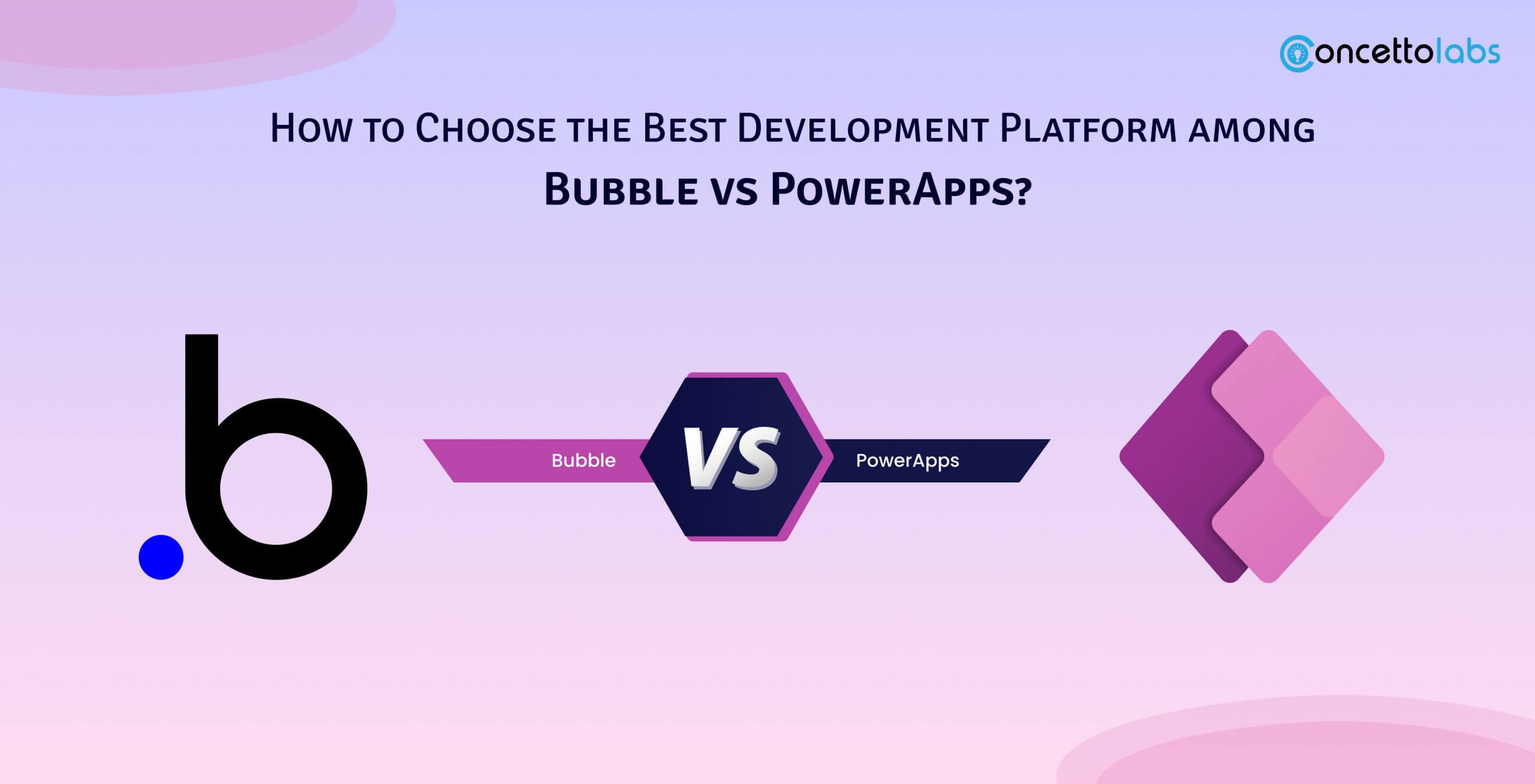






 Indonesia
Indonesia
 Botswana
Botswana
 USA
USA
 Italy
Italy
 Panama
Panama














 USA
USA Canada
Canada UK
UK Norway
Norway India
India Australia
Australia